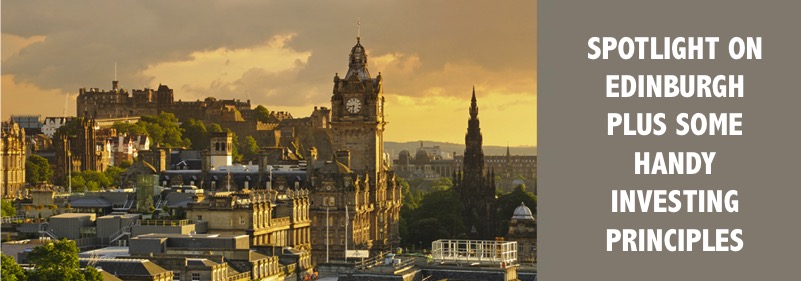This week I attended a great property investment presentation that was part of the 10 year anniversary celebrations for my friend’s Property Management business in Edinburgh, called Southside.
I thought it would be helpful for some people if I summarised and shared my notes from the talks- this will be of particular interest to those investing in Edinburgh, and even if you don’t invest in this area there are some useful principles that will apply to any area.
KEY REASONS FOR INVESTING IN EDINBURGH
- A major business centre
-Edinburgh has the strongest economy of any city in the UK outside of London
-43% of the city population holds a degree (highest in any UK City)
-Edinburgh has the most FTSE 100 organisations outside of London
2) Education & Innovation
-60,000 students across 4 universities (grown from 25,000 in 2001)
-Tech hub- Edinburgh is one of the UK’s fastest growing tech ecosystems
3) Tourism
-Edinburgh is a top tourist destination, a big contributing factor to pushing up house prices
-The Edinburgh Festival is the 3rd highest ticketed event in the world (over 3 million tickets sold in 2019)
-Year round tourism (Edinburgh had the highest hotel occupancy of all UK cities in 2017 with an ave occupancy rate of 83.7%)
4) Growing Population
-Census 2001 – population of 430,000, Census 2018 – pop of 513,000
-Edinburgh’s population is predicted to be larger than Glasgow’s by 2032
5) Housing
-Edinburgh had the highest growth in households of all Scottish cities between 2007-2017, up by 7.2%
-Strong and growing PRS (27% of Edinburgh households were recorded in the PRS in 2015, up from 14% in 2001, source – Scottish household survey)
THE 5 ‘D’ PRINCIPLE DECISIONS FOR BUYING, AND REASONS FOR A SELLER BEING MOTIVATED
The founder of Southside shared some guiding principles learned from years of investing for himself and from helping clients to do the same . Below a set of five things that an investor can seek to establish in order to uncover a deal. These are opportunities to add value and some of the reasons why a seller might be motivated and therefore willing to do a deal with you.
DEVELOPMENT
-In other words, what’s the angle to add value? Add a bedroom? Extension? Attic conversion?
DISREPAIR
-Buyers are often put off by seeing scores of 2 and 3 in the Scottish Home Reports but understanding what refurbishment is required may well be your opportunity to negotiate a lower price and in turn add value.
DEBT
-Is the vendor struggling to cover mortgage payment? Do they have other debts they need to pay off by selling a property? The landlord selling a rental property may have kept the property in poor condition so are now struggling to rent it and they don’t have the cash to refurb.
DIVORCE
-Selling of a larger property in order to downsize/split value
DEATH
-Selling part of someone’s estate
Here are some other short hand notes of interest from the series of talks:
*Always look at the floor plan of the property listing before spending time to go and view it- is there a quick win to be had by combining the kitchen and living room to create an additional bedroom? This will require an understanding of building regs for activity space and room sizes.
*Inflation is good for property investors as it has the impact of eroding the true value of the mortgage debt.
*You never want your mortgage interest to be more than one third of the gross rent. (Calculate that over time the annual costs associated with the rental property will account for approx 33% of the gross rent).
*Plan ahead for refurb projects (ie just like cars need maintenance to run smoothly we have to treat our rental properties in the same way, so rather than spend all the profit each year, put aside an amount to cover the cyclical refurbs that will be needed every 7-10 years.
*Invest for monthly cashflow, any capital gains are ‘icing on the cake’ but we can’t bank on them being there.
*There are 6000 HMO’s in Edinburgh and the market to serve is still under supplied
*Definition and criteria for an HMO in Scotland
-3 or more unrelated individuals living together in a dwelling
-HMO license is granted by the local council and can be valid for up to 3 years
-Strict criteria for the grant of a license- 3 main criteria are:
-property meets the specific HMO criteria
-Property owner is a fit and proper person/entity
-Property Manager is suitable, experienced and has processes and knowledge in place
Hopefully there were some useful insights in there that may have either validated your thinking or prompted some new actions.
Have a great week ahead.
[Congratulations to John and the team at Southside for 10 years in business, and a huge thank you for your great work in managing my properties]

